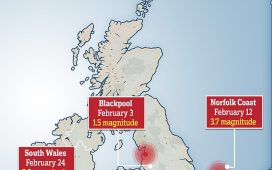[ad_1]
Researchers said they are “astounded” by the amount of ice which has been lost in Greenland thanks to a warming globe. Global warming is contributing to a loss of ice cover in the Arctic and Antarctic circles and researchers believe Greenland could be one of the worst effected. The ice covering Greenland is up to three kilometres thick in certain places, covering an area seven times the amount of the UK.
If all of this ice were to melt, it would cause sea levels to rise by a staggering seven metres, which could have major implications for the UK.
Researchers have warned Greenland is losing ice rapidly.
Dr Jason Box, Geological Survey of Denmark, told the BBC: “Already effectively that’s a death sentence for the Greenland ice sheet because also going forward in time we’re expecting temperatures only to climb.
“So, we’re losing Greenland – it’s really a question of how fast.”
According to Google’s interactive map FireTree which simulates sea level rises, Britain becomes a lot narrower, particularly along the east, thanks to a seven metre sea level rise.
Hull becomes almost completely submerged while areas east of Lincoln all the way down to the east of Cambridge will cease to exist.
London will also become a lot smaller as the Thames estuary floods, wiping out the majority of the centre of the capital.
Down south, Portsmouth, Plymouth and Brighton will struggle to remain.
READ MORE: Sea levels could rise by 10 METRES in future
Every year, the Arctic sea ice expands in the winter and then shrinks in the summer.
However, this year it shrank more than usual during the summer months, and NASA has said it is the joint second lowest since records began in 1978.
The sea ice cap shrank to 4.15 million square kilometres (1.60 million square miles) in 2019, matching the second lowest records set in 2007 and again in 2016.
The Arctic sea ice is melting at a staggering rate, with the Intergovernmental Panel on Climate Change (IPCC) stating that between 1979 and 2018, there was an average loss of 12.8 percent per decade.
The IPCC said in a statement in September: “These sea ice changes in September are likely unprecedented for at least 1,000 years.
“Arctic sea ice has thinned, concurrent with a transition to younger ice. Between 1979 and 2018, the real proportion of multi-year ice that is at least five years old has declined by approximately 90 percent.”
[ad_2]
READ SOURCE





